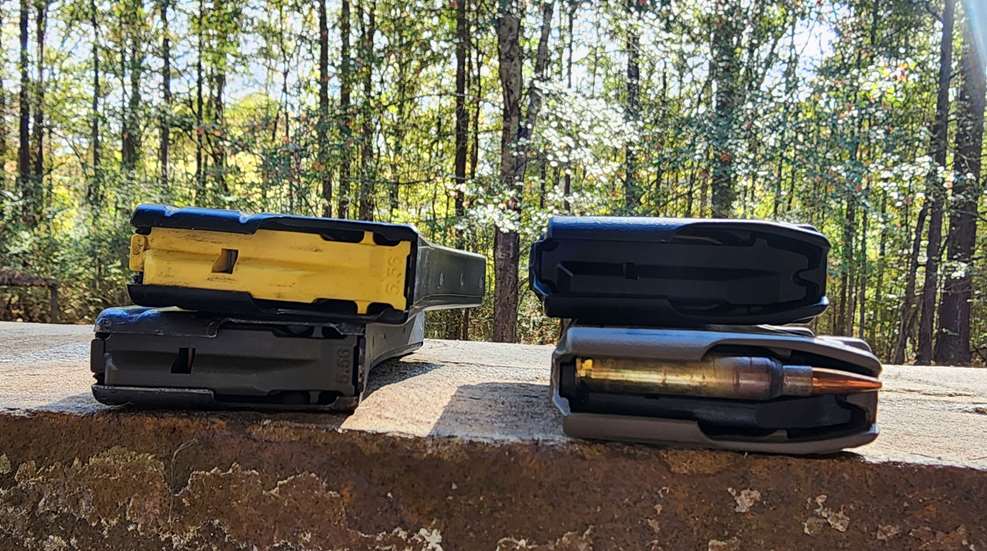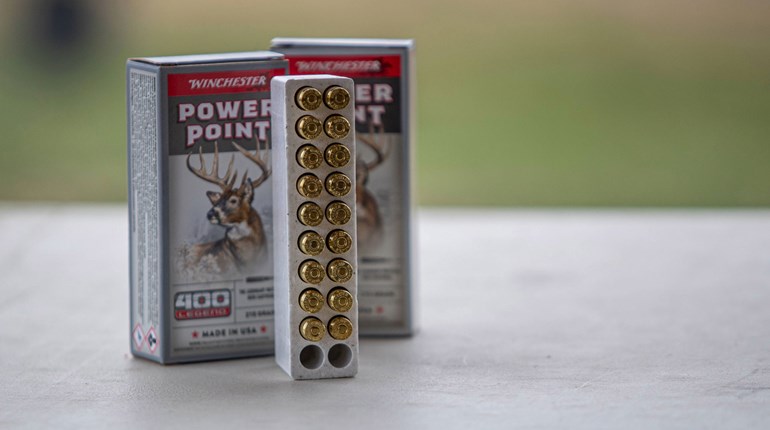
One of the handy things about semi-automatic rifles and specifically AR-15s is the huge availability and variety of aftermarket parts. Most stuff you’ll only buy once: a stock, a forearm, a rail or three, a light, an optic. But mags? You can’t have too many of them. If you’re a prepper, a competitive shooter or just an avid collector, you might be working on a stockpile of magazines for your AR. And since they come in two main varieties, you might wonder: Is metal superior to polymer, or vice versa? Or does it matter?
The short answer: It doesn’t matter. They’re both good. However, as with most things, there are pros and cons to each, and most shooters develop a preference for one over the other.
Metal Mags: Pros and Cons
Metal magazines are typically made of steel, but sometimes aluminum. Steel mags are generally heavier than polymer mags; aluminum magazines are typically lighter than polymer. Whether or not weight is a good thing in this case depends on what you’re doing. If you’re schlepping 50 mags around in a duffle bag in an escape-the-zombie-apocalypse scenario, you want light. If you’re working on fast shooting and quick mag changes, perhaps in a competition or range training work, a heavier mag might be preferable—their weight often makes empty mags drop from the rifle easier.
The good thing about steel and aluminum is that metal is stronger than polymer, which is a major plus on the durability scale. The bad thing about metal (at least at this thickness) is that it can bend. Specifically, the feeding lips that hold rounds in the mag won’t wear out because metal is so strong, but they can bend or dent over time just slightly enough to cause feeding problems—problems you won’t know you have until you’re shooting and start experiencing malfunctions. Good news: You can often bend or manipulate the metal feed lips back into place once you discover the problem.
The other bad thing about metal is that it is prone to rust and corrosion in harsh elements. Over time, small amounts of moisture can hide in the crevices of your metal mags and cause rust. I don’t consider this much of a problem, though, because at the end of the day, magazines are a semi-disposable item. We’re hard on them—we drop them in the dirt and on rocks, we bang them around inside shooting bags, and they’re the last thing we think to clean if we do at all. They’re just not meant to last forever, and they’re not horrifically expensive, so a little rust isn’t the end of the world to me.

Polymer Mags: Pros and Cons
Polymer (plastic) mags come in a lot of varieties, and many of them are quite good. As noted above, polymer is lighter than steel, which means you might not get mag drops that are quite as reliable as you would with heavier steel mags, but if you’re carrying a lot of them around, the weight savings will be welcome.
Although it’s strong, polymer can’t compete with the strength of metal. It can swell or warp at extreme temperatures, which might or might not be a problem for you depending on where you live and how you use your gear. Regarding the feeding lips issue mentioned above, polymer will not bend—it will either wear out and stop holding rounds in at all, or it will outright break. This is actually a good thing, because if it breaks, you’ll know it immediately, and you’ll just toss that mag instead of unknowingly feeding a flawed magazine into your gun and experiencing malfunctions as a result.
Polymer mags are sometimes (but not in all cases) cheaper than metal magazines, and they’re generally quieter when they bump against stuff or just by themselves—I find them less rattly than metal mags in most cases.
You need to know that not all actions “like” polymer mags as much as they do metal; in other words, polymer mags might not lock up as reliably or as strongly as metal magazines do. And, as with many synthetic parts of many guns, polymer mags might be affected by strong solvents, so be careful when cleaning.

The Verdict
There’s no clear answer on whether metal is better than polymer or vice versa. Metal is stronger, but not necessarily more durable because of the rust factor. Polymer mags, assuming your gun plays nicely with them (most do), are generally lighter and are less likely give you heat-of-the-moment feeding problems.
Personally, I have collected some of each type over the years, and I’ll happily shoot with either. I think owning a selection is probably a smart idea, so you always have options. If given a choice, however, I usually choose to shoot with polymer mags. They feel warmer and more comfortable to me in the same way a walnut stock on a classic hunting rifle feels warmer and more comfortable. They don’t give off the sharp-edged, rattle-inside vibe that metal mags do—and that’s a personal preference, not a statement that tough and rattly is necessarily bad. I just like the smooth feel. However, if I know I’m going to be doing a lot of drills that involve mags dropping into the dirt, I often go with metal, because I like the weight of the steel, and if the mags pick up any scratches in all that dropping, it kind of adds to their rugged, tough look.
Whichever you choose—and again, a selection of both is a great idea—be sure to clean your mags from time to time, inspect the feeding lips for dents (metal) or cracks and chips (polymer), and remember that ultimately, these are semi-disposable items that aren’t meant to last as long as your gun itself will.














































